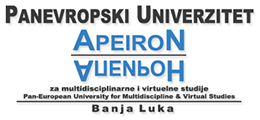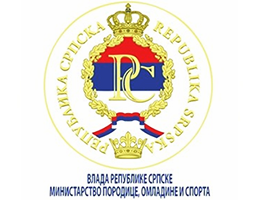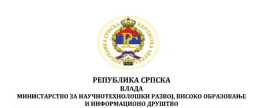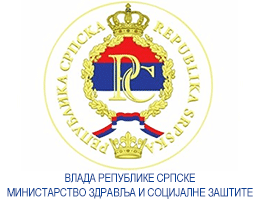Technological Readiness and Psychological Well-Being Serve as Predictors of Students’Academic Performance?
Volume 13, Issue 1 (2023)
Volume 13, Issue 1 (2023)
Technological Readiness and Psychological Well-Being Serve as Predictors of Students’Academic Performance?
Apstrakt:
This study intends to investigate the relationship between technology readiness and psychological well-being
with academic performance. The investigation utilised a quantitative approach and correlational statistical procedure. In
this study, the participants were students majoring in physical education at the Universitas Negeri Surabaya in Indonesia
(n=85). The current study adopted questionnaires to evaluate technology readiness and psychological well-being, whereas
test scores served as indicators of student academic accomplishment. IBM SPSS was employed to evaluate this study’s
normality and descriptive statistics. In the meantime, the Pearson correlation was utilised to test the relationship between
variables. A multiple regression analysis was run to examine the strongest predicator of technology readiness, psychological
well-being with academic performance. The results indicated a significant positive relationship between of technology
readiness and psychological well-being with academic performance (p-values≤0.05). Thus, it may be inferred that technology
readiness and psychological well-being components could be predictors of academic performance in physical education
for students. This study’s findings contribute to our knowledge and supply lecturers with information and scientific
insight into the significance of technology readiness and psychological well-being for university students.
Ključne riječi:
Technology Readiness, Psychology Well-Being, Academic Performance, Physical education
Puni tekst:
Reference:
Abdullah, N. A., Shamsi, N. A., Jenatabadi, H. S., Ng, B. K., & Mentri, K. A. C. (2022). Factors Affecting Undergraduates’ Academic Performance
during COVID-19: Fear, Stress and Teacher-Parents’ Support. Sustainability (Switzerland), 14(13). https://doi.org/10.3390/
su14137694
Ahmad, N. S., Ismail, A., & Husain, Z. (2022). Psychological well-being impacts among university students on online learning during the
COVID-19 pandemic. International Journal of Public Health Science, 11(3), 1037–1045. https://doi.org/10.11591/ijphs.v11i3.21413
Andarwulan, T., Al Fajri, T. A., & Damayanti, G. (2021). Elementary teachers’ readiness toward the online learning policy in the new normal
era during Covid-19. International Journal of Instruction, 14(3), 771–786. https://doi.org/10.29333/iji.2021.14345a
Blut, M., & Wang, C. (2020). Technology-readiness-a-metaanalysis-of-conceptualizations-of-the construct-and-its-impact-on-technology-usageJournal-
of-the-Academy-of-Marketing Science.pdf. 649–669.
Bubou, G. M., & Job, G. C. (2020). Individual innovativeness , self- efficacy and e-learning readiness of students of Yenagoa study centre ,
National Open University of Nigeria. Journal of Research in Innovative Teaching & Learning, 15(1), 2–22. https://doi.org/10.1108/
JRIT-12-2019-0079
Butt, S., Mahmood, A., & Saleem, S. (2022). The role of institutional factors and cognitive absorption on students’ satisfaction and performance
in online learning during COVID 19. PLoS ONE, 17(6 June), 1–30. https://doi.org/10.1371/journal.pone.0269609
Calabuig-Moreno, F., González-Serrano, M. H., Fombona, J., & García-Tascón, M. (2020). The emergence of technology in physical education:
A general bibliometric analysis with a focus on virtual and augmented reality. Sustainability (Switzerland), 12(7), 1–23. https://
doi.org/10.3390/su12072728
Chang, Y. Z., Yu, C. W., Chao, C. M., & Lin, F. C. (2020). Influences on medical app adoption by patients: the unified theory of acceptance and
use of technology model and the moderating effects of technology readiness. Social Science Journal, 00(00), 1–14. https://doi.org/10.
1080/03623319.2020.1848338
Deng, X., & Yang, Z. (2021). Digital proficiency and psychological well-being in online learning: Experiences of first-generation college students
and their peers. Social Sciences, 10(6). https://doi.org/10.3390/socsci10060192
Fang, J. D. D., Teng, P. C., & Wang, F. J. (2021). The impact of physical education classes on health and quality of life during the covid‐19.
Applied Sciences (Switzerland), 11(19). https://doi.org/10.3390/app11198813
Ferreira, J. B., da Rocha, A., & da Silva, J. F. (2013). Impacts of technology readiness on emotions and cognition in Brazil. Journal of Business
Research, 67(5), 865–873. https://doi.org/10.1016/j.jbusres.2013.07.005
Fierro, A. A., Philominraj, A., Vitoria, R. V., & Grisales, N. E. M. (2022). Teaching in Physical Education during Pandemic COVID-19: A Study
of University Teachers. International Journal of Human Movement and Sports Sciences, 10(5), 973–981. https://doi.org/10.13189/
saj.2022.100514
Fokkens-Bruinsma, M., Vermue, C., Deinum, J. F., & van Rooij, E. (2021). First-year academic achievement: the role of academic self-efficacy,
self-regulated learning and beyond classroom engagement. Assessment and Evaluation in Higher Education, 46(7), 1115–1126. https://
doi.org/10.1080/02602938.2020.1845606
Geng, S., Law, K. M. Y., & Niu, B. (2019). Investigating self-directed learning and technology readiness in blending learning environment.
International Journal of Educational Technology in Higher Education, 16(1). https://doi.org/10.1186/s41239-019-0147-0
Gustems-Carnicer, J., Calderon, C., Calderon-Garrido, D., & Martin-Piñol, C. (2020). Academic progress, coping strategies and psychological
distress among teacher education students. International Journal of Educational Psychology, 9(3), 290–312. https://doi.org/10.17583/
ijep.2020.4905
Hanif, A. S., Amelia, S. R., Nurdin, F., Hernawan, Maslikah, U., Usra, M., Gani, R. A., Setiawan, E., & Jumareng, H. (2021). Investigating
lecturers’ perceptions of the performance of computer-based and paper pencils-based for assessing sports training program during
covid-19. International Journal of Human Movement and Sports Sciences, 9(5), 1004–1010. https://doi.org/10.13189/saj.2021.090522
Hashemi, A. (2021). Effects of COVID-19 on the academic performance of Afghan students’ and their level of satisfaction with online teaching.
Cogent Arts and Humanities, 8(1). https://doi.org/10.1080/23311983.2021.1933684
Ilhan, A., & Otman, N. (2020). Analysis of Psychological Well-Being and Happiness Levels of University Students Who Do Swimming and
Fitness. African Educational Research Journal, 8(8), 273–278. https://doi.org/10.30918/AERJ.8S2.20.056
Jastrow, F., Greve, S., Thumel, M., Diekhoff, H., & Süßenbach, J. (2022). Digital technology in physical education: a systematic review of research
from 2009 to 2020. German Journal of Exercise and Sport Research, October 2021. https://doi.org/10.1007/s12662-022-00848-5
Jeoung, B. (2020). Correlation of physical fitness with psychological well-being, stress, and depression in Korean adults. Journal of Exercise
Rehabilitation, 16(4), 351–355. https://doi.org/10.12965/jer.2040454.227
Juliantine, T., Setiawan, E., Jumareng, H., Gani, R. A., & Asnaldi, A. (2022). Do Fundamental Movement Skills, Physical Activity And Enjoyment
Among Inactive Student During The Covid-19 Era Improve After Exergame? Journal of Physical Education (Maringa), 33(2),
Jumareng, H., & Setiawan, E. (2021). Self-esteem, adversity quotient and self-handicapping: Which aspects are correlated with achievement
goals? Cakrawala Pendidikan, 40(1), 147–157. https://doi.org/10.21831/cp.v40i1.37685
Jumareng, H., Setiawan, E., Asmuddin, A., Rahadian, A., Gazali, N., & Badaruddin, B. (2022). Online Learning for Children with Disabilities
During the COVID-19: Investigating Parents’ Perceptions. The Qualitative Report, 27(2), 591–604. https://doi.org/https://doi.
org/10.46743/2160-3715/2022.4926
Jumareng, H., Setiawan, E., & Németh, Z. (2022). Augmented pokemon go in times of COVID-19 : does it have any effect on promoting teenagers
’ physical activity ? Teorìâ Ta Metodika Fìzičnogo Vihovannâ, 22(3), 360–365. https://doi.org/10.17309/tmfv.2022.3.09
Jumareng, H., Setiawan, E., Patah, I. A., Aryani, M., Asmuddin, A., & Gani, R. A. (2021). Online Learning and Platforms Favored in Physical
Education Class during COVID-19 Era: Exploring Student’ Perceptions. International Journal of Human Movement and Sports Sciences,
9(1), 11–18. https://doi.org/10.13189/saj.2021.090102
Ku-Johari, K. ., Bali-Mahomed, N. ., Mahmud, M. ., Amat, S., & Saadon, S. (2022). Psychological Well-Being of School Counsellors Model.
European Journal of Educational Research, 11(1), 325–337.
Kuhfeld, M., Soland, james, Tarasawa, B., Johnson, A, Ruzek, E., & Liu, J. (2020). Projecting the Potential Impact of COVID-19 School
Closures on Academic Achievement. Educational Researcher, 49(December). https://doi.org/10.3102/0013189X20965918
Li, S. (2021). Psychological Well-being, Mindfulness, and Immunity of Teachers in Second or Foreign Language Education: A Theoretical
Review. Frontiers in Psychology, 12(July), 1–9. https://doi.org/10.3389/fpsyg.2021.720340
López-Valenciano, A., Suárez-Iglesias, D., Sanchez-Lastra, M. A., & Ayán, C. (2021). Impact of COVID-19 Pandemic on University Students’
Physical Activity Levels: An Early Systematic Review. Frontiers in Psychology, 11(January), 1–10. https://doi.org/10.3389/
fpsyg.2020.624567
Mohd Faizal, S., Jaffar, N., & Mohd nor, A. S. (2022). Integrate the adoption and readiness of digital technologies amongst accounting professionals
towards the fourth industrial revolution. Cogent Business and Management, 9(1). https://doi.org/10.1080/23311975.2022.21
22160
Moore, P. J. (2019). Academic achievement and social and emotional learning. Educational Psychology, 39(8), 981–983. https://doi.org/10.1
080/01443410.2019.1643971
Mouloud, K., & Nawal, K. (2020). The relationship between the social responsibility and the job. Pedagogy of Physical Culture and Sports,
24(4), 0–4. https://doi.org/10.15561/26649837.2020.0408
Mujriah, Siswantoyo, Sukoco, P., Rosa, F. ., Susanto, E., & Setiawan, E. (2022). Traditional Sport Model to Improve Fundamental Movement
Skills And Social Attitudes Of Students During COVID-19. Physical Education Theory and Methodology, 22(3), 309–315. https://doi.
org/10.17309/tmfv.2022.3.02
Mukerjee, H. S., Deshmukh, G. K., & Prasad, U. D. (2019). Technology Readiness and Likelihood to Use Self-Checkout Services Using Smartphone
in Retail Grocery Stores: Empirical Evidences from Hyderabad, India. Business Perspectives and Research, 7(1), 1–15. https://
doi.org/10.1177/2278533718800118
Muqodas, I., Kartadinata, S., Nurihsan, J., Dahlan, T., Yusuf, S., & Imaddudin, A. (2020). Psychological Well-being: A Preliminary Study of
Guidance and Counseling Services Development of Preservice Teachers in Indonesia. International Conference on Educational Psychology
and Pedagogy, 399(Icepp 2019), 56–60. https://doi.org/10.2991/assehr.k.200130.080
Piñeiro-Cossio, J., Fernández-Martínez, A., Nuviala, A., & Pérez-Ordás, R. (2021). Psychological well-being in physical education and school
sports: A systematic review. International Journal of Environmental Research and Public Health, 18(3), 1–16. https://doi.org/10.3390/
ijerph18030864
Prasetyanto, D., Rizki, M., & Sunitiyoso, Y. (2022). Online Learning Participation Intention after COVID-19 Pandemic in Indonesia: Do Students
Still Make Trips for Online Class? Sustainability (Switzerland), 14(4). https://doi.org/10.3390/su14041982
Priambodo, A., Prakoso, B. B., & Setyorini. (2022). Correlation Between Psychological Well-being and Satisfaction of Life on Physical Education
Teachers. Proceedings of the International Joint Conference on Arts and Humanities 2021 (IJCAH 2021), 618(Ijcah), 400–404.
Rahman, F. F., Hamka, & Lin, K. (2020). The Psychological Well-Being of Newly-Arrived Indonesian Students in Taiwan Kesejahteraan Psikologis
Mahasiswa Baru Indonesia di Taiwan. Journal of International Students, 1(S3), 44–57.
Roy, M. L., & Gupta, K. (2022). A Study of Impact of Culture on Psychological Wellbeing among the Teaching Faculty Members of Private
University in Raipur. Journal of Positive School Psychology, 6(3), 10136–10152.
Tan, Y., Huang, C., Geng, Y., Cheung, S. P., & Zhang, S. (2021). Psychological Well-Being in Chinese College Students During the COVID-
19 Pandemic: Roles of Resilience and Environmental Stress. Frontiers in Psychology, 12(May), 1–9. https://doi.org/10.3389/
fpsyg.2021.671553
Tentama, F., & Abdillah, M. H. (2019). Student employability examined from academic achievement and self-concept. International Journal
of Evaluation and Research in Education, 8(2), 243–248. https://doi.org/10.11591/ijere.v8i2.18128
Teresa, M. T., Guss, C. D., & Boyd, L. (2021). Thriving during COVID-19: Predictors of psychological well-being and ways of coping. PLoS
ONE, 16(3 March), 1–19. https://doi.org/10.1371/journal.pone.0248591
Tran, N. T., Franzen, J., Jermann, F., Rudaz, S., Bondolfi, G., & Ghisletta, P. (2022). Psychological distress and well-being among students of
health disciplines in Geneva, Switzerland: The importance of academic satisfaction in the context of academic year-end and COVID-19
stress on their learning experience. PLoS ONE, 17(4 April), 1–13. https://doi.org/10.1371/journal.pone.0266612
Wahyuningsih, H., Novitasari, R., & Kusumaningrum, F. A. (2022). Emotional and psychological well-being in Indonesian adolescents: Translation
and construct validation of the Stirling Children’s Well-being Scale in a college student sample. Cogent Education, 9(1). https://
doi.org/10.1080/2331186X.2022.2060165
Wang, Y., Xia, M., Guo, W., Xu, F., & Zhao, Y. (2022). Academic performance under COVID-19: The role of online learning readiness and
emotional competence. Current Psychology, 0123456789. https://doi.org/10.1007/s12144-022-02699-7
Warden, C. A., Yi-Shun, W., Stanworth, J. O., & Chen, J. F. (2022). Millennials’ technology readiness and self-efficacy in online classes. Innovations
in Education and Teaching International, 59(2), 226–236. https://doi.org/10.1080/14703297.2020.1798269
Yosser, I. M., Syed Idrus, S. Z. Bin, & Ali, A. A. E. (2020). Technology Readiness Index 2.0 as Predictors of E-Health Readiness among Potential
Users: A Case of Conflict Regions in Libya. Journal of Physics: Conference Series, 1529(3), 0–9. https://doi.org/10.1088/1742-
6596/1529/3/032009
Yuda, A. K., Resita, C., Nurwansyah, R., Gani, R. A., Németh, Z., & Setiawan, E. (2022). Confidence, Academic Stress, Coping Strategies as
Predictors of Student Academic Achievement in Physical Education Classes During Covid-19. Teorìâ Ta Metodika Fìzičnogo Vihovannâ,
22(2), 180–187. https://doi.org/10.17309/tmfv.2022.2.05
Zanevskyy, I., & Zanevska, L. (2021). Academic and sport achievements of the physical culture and sports university students. Pedagogy of
Physical Culture and Sports, 25(3), 165–171. https://doi.org/10.15561/26649837.2021.0304






